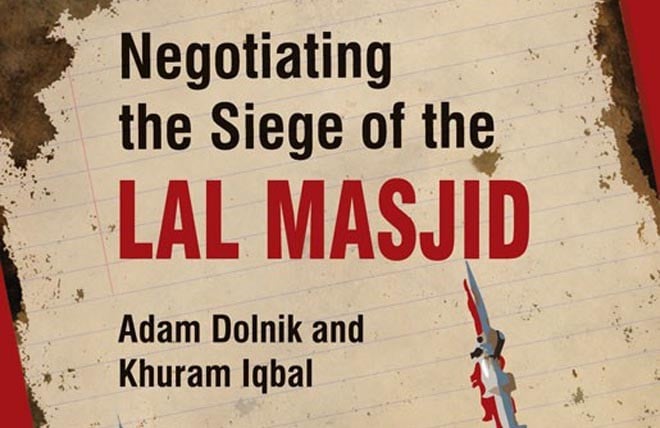
A record of the many missed opportunities that led to the collapse of negotiations and the siege of Lal Masjid

To many Lal Masjid operation was a turning point in the policy pursued by the establishment since the invasion of Afghanistan by the Soviet Union in 1979. The umbilical chord between the establishment and those carrying out the missions on ground was not snapped altogether but it was stretched to the point where it could break.
This book focuses on the negotiations, their breakdown and then the operation that resulted in violence but does not discuss at length the reasons why the blue-eyed setup of the establishment was forced to take a stand against its own benefactors. It was a classic case of biting the hand that fed it.
Pakistan has been beset with all kinds of problems, the foremost being terrorism. It has been a case of harvesting what you sowed and despite all efforts the problem has stayed. It has actually snowballed with the passage of time as the jihadi outfits lost their focus and started to spray bullets in all possible directions in the name of fighting a global jihad. This term is so big and widespread that it cannot be properly marshalled for a certain, positive, pointed role.
The storming of the Lal Masjid marked the start of the confrontation between the state and its erstwhile allies -- the militant outfits and the radical madaris. Although there was widespread understanding of the need for security operation at Lal Masjid, its actual conduct was deemed as having been excessively heavy-handed. As the title of the book amply signifies, the main thrust is that the negotiations carried out were blamed for subsequent violence.
The armed action against the mosque and the madrassa resulted in many deaths resonated badly against those in power then. According to the authors, there were many missed opportunities that led to the collapse of the negotiations.
One was that there was lack of communication as the links were not properly established. Much of the negotiations were carried out through loudspeakers and it did not result in a dialogue but a unidirectional conveying of the messages. Loudspeakers are very public, and in some cases the police uses them to establish the initial links of communication. But its public nature and unidirectionality does not make it an ideal method of carrying out negotiations.
Then it was the mobile phones that robbed the negotiators of their independence to take decision as they were constantly referring back to their bosses. These were also being used to interact with the media like press conferences and dialogues were being conducted with the entire nation being privy to it.
There was also the absence of trained negotiators; this also opened the way for outside parties. The third party intermediary, related to the security services, allowed to speak to the subjects in the barricaded/hostage crisis is not a preferred option as they lack specialisation, are out of negotiating team’s direct control and may have past relationship with the subjects.
The irresponsible approach by the media affected the outcome of the negotiations. In some cases, the media provided critical intelligence putting the hostages at great risk and the authors also feel strongly that the media interview of Maulana Abdul Aziz following his capture while fleeing the mosque in a burka sent a message of public humiliation.
Another flaw was the handling of the militant’s demands. There seemed to be an excessive focus on the substantive nature of the demands, emphasising the political unacceptability of giving in to people who directly challenge the legitimacy of the government. The negotiator should have reinforced and rewarded the offer of surrender, instead of rejecting it outright. This should have assisted the cleric in developing a face-saving mechanism and also help him mentally to justify the gradual softening of his hard line position.
At times, negotiations are bandied as the only option out of a crisis. But negotiations always have a direct link with the strength of the parties on ground. Negotiations are just the affirmation, through peaceful means, of the relative positions of the parties involved. It is rare that any concessions are extracted from a negotiating process outside of this paradigm. At times, it may appears to be so but then the parties involved may be thinking of some option to be exercised in future which may not be obvious at that moment.
In this particular scenario, the state of Pakistan and the jihadis have to be certain as to what they want to achieve and only then there will be any purpose to the negotiations. One has witnessed a few years ago that negotiations turn out to be very botched attempt in the hands of pure amateurs. Any further negotiations between the state and whosoever will be fruitful if the positions are stated and the process is not a kind of subterfuge for something else in the name of talks.